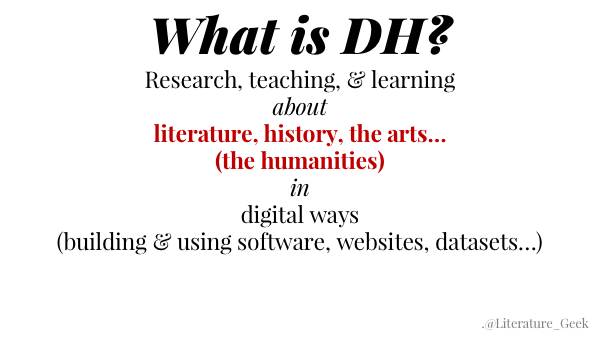What Does Digital Humanities Mean to Me?
When one thinks of the “humanities,” it typically conjures up thoughts of academic disciplines like English, History, and Philosophy. Oftentimes, those same thoughts are associated with books, libraries, and essays or papers on all sorts of topics. Even though I have grown up in an increasingly digital age, my own understanding of the humanities is tied to those same broad notions of the humanities as separate from the digital realm. Admittedly, I have found relief in learning primarily through reading books, rather than having to learn how to code or other technical skills required in different fields of study. What I have learned from brief run-ins with technology during my academic journey is how useful it can be to research or to accessibly store resources. Perhaps that is where I first discovered the world of digital humanities, and how I realized its applicability for promoting the humanities.
As Amanda Visconti writes in A Digital Humanities What, Why, & How (DLF eResearch Network Talk), the term “digital humanities” is overly defined. Visconti provides this image to define digital humanities generally:

To Visconti, digital humanities is as much about applying digital tools to research, teaching, and learning about the humanities as it is to applying humanities practices to the digital realm. So where does this leave those of us who barely understand the digital world as it is?
There is beauty and simplicity to be found in learning straight out of a book, or by taking notes from a professor’s lecture. To many different generations of people, technology is a foreign world that is difficult to navigate. But to others, it represents the promise of change and the evolution of human progress. But where can the middle ground be found? Digital humanities is one such bridge. It combines research from a wealth of topics that would most likely be confined to papers and essays that few would read outside of academic circles, with the accessibility and speed of the internet. I have become so comfortable with the minutia of the humanities; how to engage in historiography and use proper citation. To become equipped to succeed in this broad academic field of study, I had to learn the “language” of the humanities. For that very same reason, I first approached the digital world with apprehension. Digital humanities has another academic language, one that is defined by the collaboration between two different worlds which together form an extremely useful tool.
There are five main values of digital humanities, which are described in detail in Lisa Spiro’s book chapter “This is Why We Fight: Defining the Values of the Digital Humanities.” These five values are: Openness, Collaboration, Collegiality/Connectedness, Diversity, and Experimentation. Understanding these values is key towards utilizing digital humanities to its fullest extent possible. While each value may mean something different to every person, the pursuit of them in digital humanities makes our work more comprehensive. What I have learned so far about digital humanities is that it is ever-evolving, and as much about the end product as it is the process.
Written by B. Johnson, Student at Gettysburg College and part of the DSSF Cohort for the Summer of 2021.